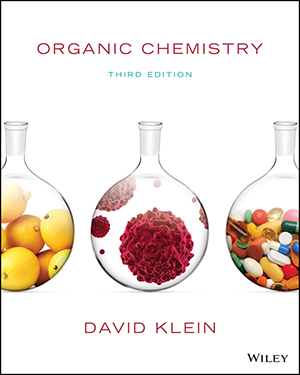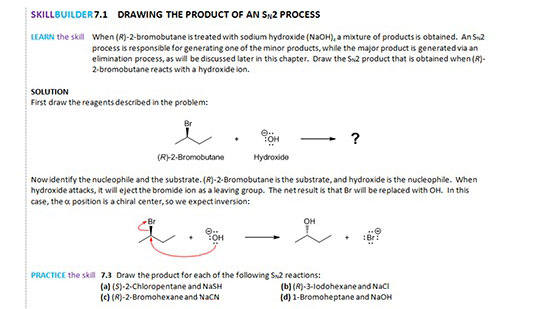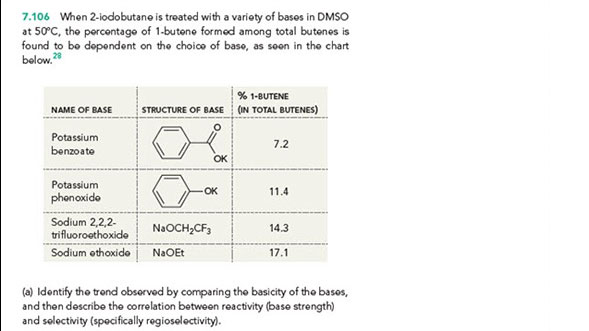
Organic Chemistry, 3rd Edition
By David Klein
Author David Klein builds on the phenomenal success of the first two editions, which presents a unique skills-based approach to learning Organic Chemistry. This course covers the concepts typically taught in an organic chemistry course, while placing a special emphasis on the skills development needed to support them. SkillBuilder examples provide extensive opportunities for two-semester organic chemistry students to develop proficiency in the key skills necessary to succeed.
Schedule a Demo Sign Up for a Test Drive Adopt WileyPLUSWant to learn more about WileyPLUS? Click Here
Learn about Skill-Builders, a core component of Organic Chemistry, directly from Author David Klein.

Skills-based instruction was designed to address the disconnect in organic chemistry between theory and practice. The textbook includes all of the concepts typically covered in an organic chemistry textbook, complete with conceptual checkpoints that promote mastery of the concepts, but special emphasis is placed on skills development through SkillBuilders to support these concepts. Each SkillBuilder contains 3 parts:
Learn the Skill: contains a solved problem that demonstrates a particular skill.
Practice the Skill: includes numerous problems (similar to the solved problem in Learn the Skill) that give students valuable opportunities to practice and master the skill.
Apply the Skill: contains one or two more challenging problems in which the student must apply the skill in a slightly different environment. These problems include conceptual, cumulative, and applied problems that encourage students to think outside of the box. Sometimes problems that foreshadow concepts introduced in later chapters are also included.

Expanded collection of literature-based problems show that organic chemistry is central to addressing global challenges.
Literature-based problems were written to help bridge the gap between organic chemistry theory and real-world practice. These problems are now offered at both a medium and challenging level of difficulty and will expose students to the fact that organic chemistry is an evolving, active branch of science central to addressing global challenges.
The literature-based problems are more challenging than the problems presented in the text’s SkillBuilders because they require the students to think “outside the box” and to predict or explain an unexpected observation. All of these problems are based on the chemical literature and include references.
Videos guide students through the problem-solving process.
Solved Problem Videos give students an opportunity to see the course author in action as he solves literature-based problems from the end of each course section.
Do you have a student like Abigail?
Hear first hand how David Klein’s Skills-based approach helped teach the “why” behind the theory, and develop the problem-solving skills that are so critical to success in Organic Chemistry.

David Klein is a senior lecturer in the department of chemistry at Johns Hopkins University where he has taught organic chemistry since 1999. Having worked with thousands of students, he has intense first-hand knowledge of how they learn and the difficulties they encounter. He received his bachelor’s degree in chemistry from Johns Hopkins University and his Ph.D. from the University of California at Los Angeles under the supervision of Professor Orville Chapman. Motivated by his experiences teaching organic chemistry as a graduate student at UCLA, Klein wrote Organic Chemistry as a Second Language (John Wiley & Sons, 2004, updated 2nd Edition published in 2008), which has become a highly valued student study resource. Klein has received numerous teaching awards at both UCLA and Johns Hopkins for his unique, skill-building approach to organic chemistry instruction.
1. A Review of General Chemistry: Electrons, Bonds, and Molecular Properties
2. Molecular Representations
3. Acids and Bases
4. Alkanes and Cycloalkanes
5. Stereoisomerism
6. Chemical Reactivity and Mechanisms
7. Substitution and Elimination Reactions of Alkyl Halides
8. Addition Reactions of Alkenes
9. Alkynes
10. Radical Reactions
11. Synthesis
12. Alcohols and Phenols
13. Ethers and Epoxides; Thiols and Sulfides
14. Infrared Spectroscopy and Mass Spectrometry
15. Nuclear Magnetic Resonance Spectroscopy
16. Conjugated Pi Systems and Pericyclic Reactions
17. Aromatic Compounds
18. Aromatic Substitution Reactions
19. Aldehydes and Ketones
20. Carboxylic Acids and Their Derivatives
21. Alpha Carbon Chemistry: Enols and Enolates
22. Amines
23. Organometallic Reactions
24. Carbohydrates
25. Amino Acids, Peptides, and Proteins
26. Lipids
27. Synthetic Polymers

